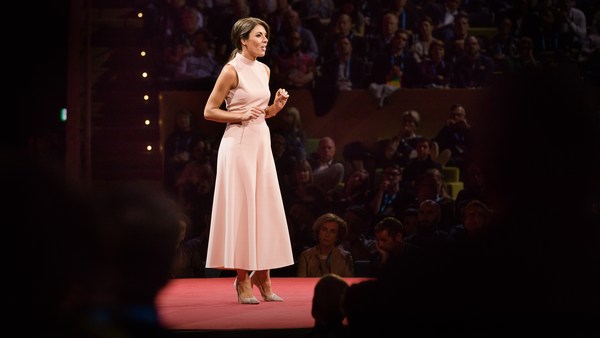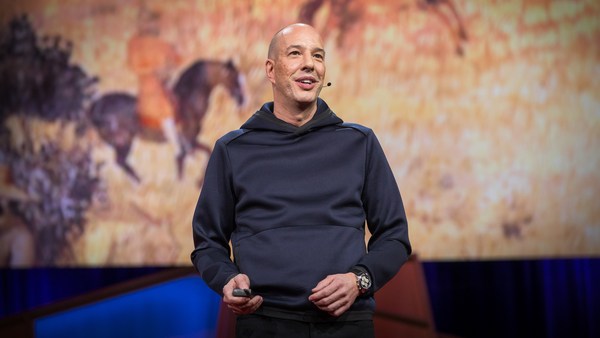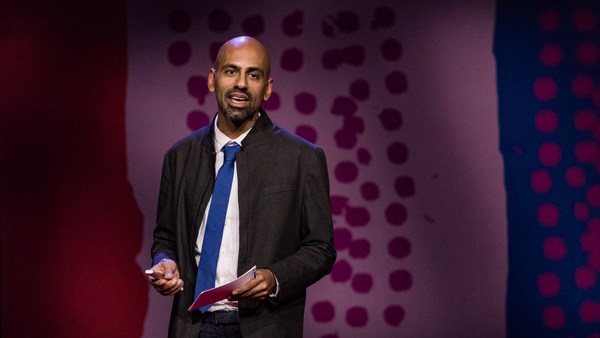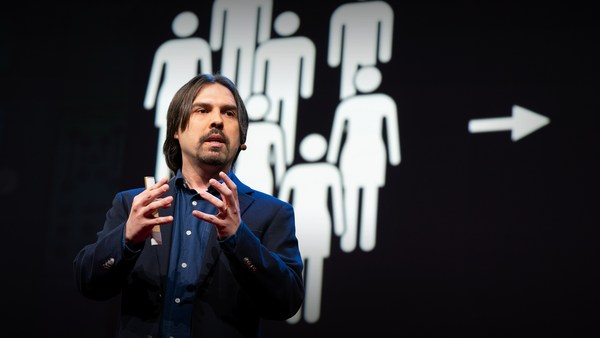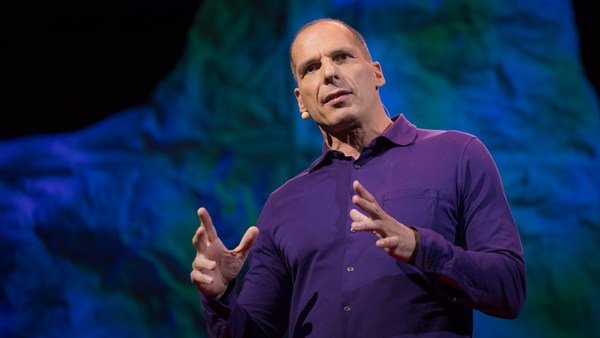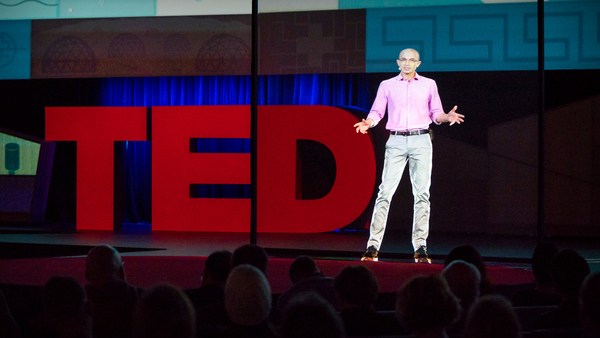I want to talk about one of the big questions, perhaps the biggest question: How should we live together? How should a group of people, who perhaps live in a city or in the continent or even the whole globe, share and manage common resources? How should we make the rules that govern us?
This has always been an important question. And today, I think it's even more important than ever if we want to address rising inequality, climate change, the refugee crisis, just to name a few major issues. It's also a very old question. Humans have been asking themselves this question ever since we lived in organized societies.
Like this guy, Plato. He thought we needed benevolent guardians who could make decisions for the greater good of everyone. Kings and queens thought they could be those guardians, but during various revolutions, they tended to lose their heads. And this guy, you probably know. Here in Hungary, you lived for many years under one attempt to implement his answer of how to live together. His answer was brutal, cruel and inhumane. But a different answer, a different kind of answer, which went more or less into hibernation for 2,000 years, has had profound recent success. That answer is, of course, democracy.
If we take a quick look at the modern history of democracy, it goes something like this. Along here, we're going to put the last 200 years. Up here, we're going to put the number of democracies. And the graph does this, the important point of which, is this extraordinary increase over time, which is why the 20th century has been called the century of democracy's triumph, and why, as Francis Fukuyama said in 1989, some believe that we have reached the end of history, that the question of how to live together has been answered, and that answer is liberal democracy. Let's explore that assertion, though. I want to find out what you think.
So I'm going to ask you two questions, and I want you to put your hands up if you agree. The first question is: Who thinks living in a democracy is a good thing? Who likes democracy? If you can think of a better system, keep your hands down. Don't worry about those who didn't raise their hands, I'm sure they mean very well. The second question is: Who thinks our democracies are functioning well? Come on, there must be one politician in the audience somewhere.
(Laughter)
No. But my point is, if liberal democracy is the end of history, then there's a massive paradox or contradiction here. Why is that? Well, the first question is about the ideal of democracy, and all these qualities are very appealing. But in practice, it's not working. And that's the second question. Our politics is broken, our politicians aren't trusted, and the political system is distorted by powerful vested interests.
I think there's two ways to resolve this paradox. One is to give up on democracy; it doesn't work. Let's elect a populist demagogue who will ignore democratic norms, trample on liberal freedoms and just get things done. The other option, I think, is to fix this broken system, to bring the practice closer to the ideal and put the diverse voices of society in our parliaments and get them to make considered, evidence-based laws for the long-term good of everyone. Which brings me to my epiphany, my moment of enlightenment. And I want you to get critical. I want you to ask yourselves, "Why wouldn't this work?" And then come and talk to me afterwards about it. Its technical name is "sortition." But its common name is "random selection." And the idea is actually very simple: we randomly select people and put them in parliament.
(Laughter)
Let's think about that for a few more minutes, shall we? Imagine we chose you and you and you and you and you down there and a bunch of other random people, and we put you in our parliament for the next couple of years. Of course, we could stratify the selection to make sure that it matched the socioeconomic and demographic profile of the country and was a truly representative sample of people. Fifty percent of them would be women. Many of them would be young, some would be old, a few would be rich, but most of them would be ordinary people like you and me. This would be a microcosm of society. And this microcosm would simulate how we would all think, if we had the time, the information and a good process to come to the moral crux of political decisions. And although you may not be in that group, someone of your age, someone of your gender, someone from your location and someone with your background would be in that room.
The decisions made by these people would build on the wisdom of crowds. They would become more than the sum of their parts. They would become critical thinkers with access to experts, who would be on tap but not on top. And they could prove that diversity can trump ability when confronting the wide array of societal questions and problems. It would not be government by public opinion poll. It would not be government by referendum. These informed, deliberating people would move beyond public opinion to the making of public judgments.
However, there would be one major side effect: if we replaced elections with sortition and made our parliament truly representative of society, it would mean the end of politicians. And I'm sure we'd all be pretty sad to see that.
(Laughter)
Very interestingly, random selection was a key part of how democracy was done in ancient Athens. This machine, this device, is called a kleroteria. It's an ancient Athenian random-selection device. The ancient Athenians randomly selected citizens to fill the vast majority of their political posts. They knew that elections were aristocratic devices. They knew that career politicians were a thing to be avoided. And I think we know these things as well. But more interesting than the ancient use of random selection is its modern resurgence. The rediscovery of the legitimacy of random selection in politics has become so common lately, that there's simply too many examples to talk about.
Of course, I'm very aware that it's going to be difficult to institute this in our parliaments. Try this -- say to your friend, "I think we should populate our parliament with randomly selected people." "Are you joking? What if my neighbor gets chosen? The fool can't even separate his recycling." But the perhaps surprising but overwhelming and compelling evidence from all these modern examples is that it does work. If you give people responsibility, they act responsibly. Don't get me wrong -- it's not a panacea. The question is not: Would this be perfect? Of course not. People are fallibly human, and distorting influences will continue to exist.
The question is: Would it be better? And the answer to that question, to me at least, is obviously yes. Which gets us back to our original question: How should we live together? And now we have an answer: with a parliament that uses sortition. But how would we get from here to there? How could we fix our broken system and remake democracy for the 21st century?
Well, there are several things that we can do, and that are, in fact, happening right now. We can experiment with sortition. We can introduce it to schools and workplaces and other institutions, like Democracy In Practice is doing in Bolivia. We can hold policy juries and citizens' assemblies, like the newDemocracy Foundation is doing in Australia, like the Jefferson Center is doing in the US and like the Irish government is doing right now. We could build a social movement demanding change, which is what the Sortition Foundation is doing in the UK. And at some point, we should institute it.
Perhaps the first step would be a second chamber in our parliament, full of randomly selected people -- a citizens' senate, if you will. There's a campaign for a citizens' senate in France and another campaign in Scotland, and it could, of course, be done right here in Hungary. That would be kind of like a Trojan horse right into the heart of government. And then, when it becomes impossible to patch over the cracks in the current system, we must step up and replace elections with sortition.
I have hope. Here in Hungary, systems have been created, and systems have been torn down and replaced in the past. Change can and does happen. It's just a matter of when and how.
Thank you. (Hungarian) Thank you.
(Applause)
